牛津译林高中分模块单元语法点总结
高考英语一轮复习:牛津译林版模块五各单元语法点总结
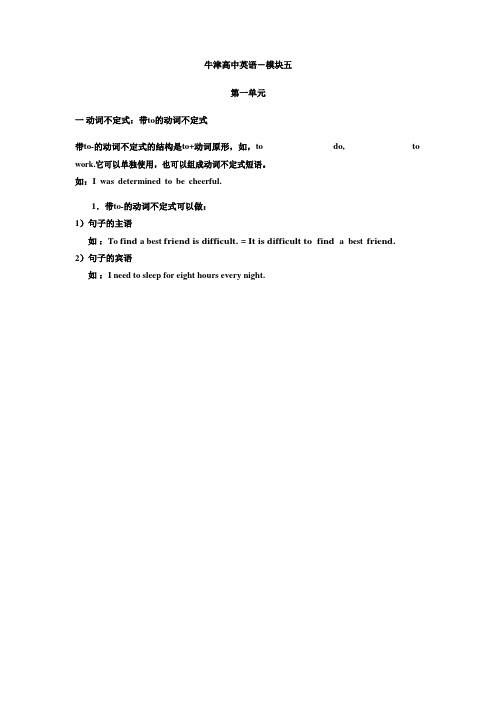
牛津高中英语-模块五第一单元一动词不定式:带to的动词不定式带to-的动词不定式的结构是to+动词原形,如,to do, to work.它可以单独使用,也可以组成动词不定式短语。
如:I was determined to be cheerful.1.带to-的动词不定式可以做:1)句子的主语如:To find a best friend is difficult. = It is difficult to find a best friend.2)句子的宾语如:I need to sleep for eight hours every night.2)宾语不足语如:I asked him to come over.3)定语如:I have a very important meeting to attend.4)同位语如:His intention was to cheer me up.5)状语如:My dad arranged some swimming lessons to surprise me.2.带to-的动词不定式有进行时态和完成时态如:Things seem to be getting better.John pretended not to have seen me.二动词不定式:不带to的动词不定式1.可用于不带to的动词不定式的动词有:1)let make have(有时候)如:I let her borrow my book.She made me promise to write every day.The teacher often has his students read aloud in class.2)感官动词:feel hear see watch如:I saw her talk to her new friends.3)would rather had better why not如:I would rather go swimming.You had better tidy your bedroom Whynot visit your cousin in Japan?注:感官动词后可以接v-ing如:I saw her talk to her new friend. (见证谈话的整个过程)I saw her talking to her new friend. (见证谈话正在发生,但不一定见证整个谈话过程)1.当有and, or, except, but, than, rather than, 连接两个动词不定式时,后一个不定式往往省略to。
译林牛津高中英语高一英语模块1第一单元和第二单元短语词汇梳理
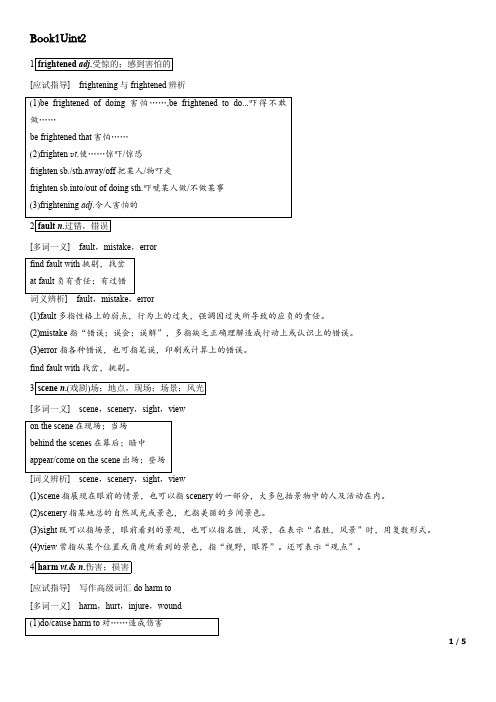
Book1Uint21frightened adj.受惊的;感到害怕的[应试指导]frightening与frightened辨析2fault n.过错,错误[多词一义]fault,mistake,errorerror(1)fault多指性格上的弱点,行为上的过失,强调因过失所导致的应负的责任。
(2)mistake指“错误;误会;误解”,多指缺乏正确理解造成行动上或认识上的错误。
(3)error 指各种错误,也可指笔误,印刷或计算上的错误。
find fault with找岔,挑剔。
3scene n.(戏剧)场;地点,现场;场景;风光[多词一义]scene,scenery,sight,view(1)scene指展现在眼前的情景,也可以指scenery的一部分,大多包括景物中的人及活动在内。
(2)scenery指某地总的自然风光或景色,尤指美丽的乡间景色。
(3)sight既可以指场景,眼前看到的景观,也可以指名胜,风景,在表示“名胜,风景”时,用复数形式。
(4)view常指从某个位置或角度所看到的景色,指“视野,眼界”。
还可表示“观点”。
4harm vt.& n.伤害;损害[应试指导]写作高级词汇do harm to[多词一义]harm,hurt,injure,wound(1)harm指对人或事物造成危害,这种危害不一定是直接的,也不一定有痛楚。
(2)hurt多用来表示伤害身体或某一部位,或表示剧烈的疼痛或精神上受到伤害。
(3)injure着重指因意外或事故造成的健康、机能、外貌的伤害。
(4)wound主要指在战斗中武器或凶器等造成的外伤或剧烈的痛苦。
5forbid vt.(forbade,forbidden)禁止;不准[应试指导]后跟非谓语动词形式的考查6tend vi.趋于,趋向;招待;vt.照顾,护理[应试指导]写作高级词汇tend to7limit n.限制;限度,极限;界限;vt.限制,限定[应试指导]介词搭配8challenge vt.怀疑;挑战;n.挑战;难题;质疑[应试指导] challenging作为高级词汇替代difficult9at present 目前,现在=at the present time[应试指导] at present作为高级词汇替换nowpresent作前置定语时,意为“目前的”;作后置定语时,意为“出席的,在场的”。
牛津译林版各单元重点知识点

7A 短语和句子n.名词 v.动词 vt.及物动词 vi.不及物动词 adj.形容词 adv.副词 prep.介词 pron.代词 conj.连词 Unit 1 This is me 1. look after sb. well 好好照顾某人 = take good care of sb. 2. some of the new students 新学生中的一些 one of + 可数名词复数 …..中的一个 many of + 可数名词复数 …..中的许多 much of + 不可数名词 …..中的许多 3. introduce A to B 把A 介绍给B introduce yourself to the class 把你自己介绍给全班 myself yourself himself herself itself 我自己 你自己 他自己 她自己 它自己 ourselves yourselves themselves 我们自己 你们自己 他们自己 4. greet each other 互相问候 5. Good night 晚安 Good evening 晚上好 6. love doing …. 热爱/喜爱做….like doing …. 喜爱做….enjoy doing …. 喜欢/享受做….7. let sb. do sth.让某人做某事make sb. do sth. 使某人做某事使役动词let; make 后面接省to 的动词不定式充当宾语补足语8. like sports 喜爱运动9. after school 放学后after class 课后in class在课上10. be good at doing …… 擅长做某事=do well in doing ……11. match … with … 把….与…..搭配起来12. talk to … 对某人讲话talk with …. 与某人交谈13. tell sb. about sth. 告诉某人关于某事14. Oh; I see. 哦;我明白了..15. the restof …. …..中剩余的17. read the following words 读下面的这些单词18. pay attention to doing sth.注意做某事19. according to ….. 根据 20. in the centre of the city 在市中心 21. wear glasses 戴着眼镜 22. like all the lessons 喜欢所有的功课 23. fill in the table with your own information 用你自己的信息填表格 24. use sth. to do sth. 用某物做某事 25. need 作为行为动词的用法: need to do don ’t / doesn ’t need to do need 作为情态动词的用法: need do needn ’t do 26. spend +时间/钱 on sth. 在某事上花费时间/钱 spend +时间/钱 in doing sth. 在做某事上花费时间/钱 spend more time on sth. 在某事上花更多时间 句子: 1. How to look after your e-dog.如何照顾你的电子狗.. 2. I have short hair. = My hair is short. 我短发.. 3. Let ’s meet my new classmates. 让我们见见我的新同学.. 4. She is tall and slim. 她高而苗条.. 5. Daniel is from Nanjing.Daniel 来自南京.. =Daniel comes from Nanjing. 6. She loves dancing. 她热爱舞蹈..7. She is good at swimming.她擅长游泳..= She does well in swimming.8. This is my cousin Andy. 这是我的表弟Andy.9. Andy; this is my new classmateKitty.Andy; 这是我的新同学Kitty.10. I come from Nanjing; but now Ilive with my family inBeijing.我来自南京;但现在我和父母住在北京..11. They are all very nice. 他们都很好..Unit 2 Let ’s play sports 1.play sports 做运动 2. like walking 喜欢散步gofor a walk 去散步 takea walk 散步 3. enjoy oneself = have a good time 玩得开心= have fun = play happily4. be free 有空 be busy 繁忙5. hope to do sth.希望做某事 hope that + 句子 希望 + 宾语从句 hope sb. to do sth. × 没有此用法6. have a dream 做梦7. come true 梦想实现;成为现实8. at/on weekends = at / on theweekend 在周末 9. of course = certainly = sure 当然 10. shop v.购物 shopper 购物者 11. else 放在不定代词或疑问代词之后 something else 别的东西 nothing else 没有别的东西 what else 别的什么;还有什么 12. a lot of = lots of 许多 修饰可数名词、不可数名词 some 一些修饰可数名词、不可数名词 many 许多修饰可数名词 much 许多修饰不可数名词 13. fun 不可数名词 乐趣、享乐、有趣的事 What great fun 多么有趣的事啊 fun ----funny fun sports 有趣的运动 14. talk about 谈论 talk of 谈到;说到 15. hero – heroes 16. many times a day 一天很多次 once a week 一周一次 twice a month 一月两次 three times a year 一年三次 17. my favourite football player 我最喜爱的足球队员 18. a new member of Huanghe Football Club 黄河足球俱乐部的一个新成员19. look strong看起来强壮20. play football very well 足球踢得很21. in one ’s free time 在某人的空余时间里22. enjoy listening to music 喜欢听音乐23. make sb. do sth. 使某人做某事make sb. + adj. 使某人……make him happy 使他们开心make me sad 使我悲伤24. make a card about Li Hua制作一张关于李华的卡片25. however 使用时习惯用标点符号与前后句隔开26. activity ---- activities 活动27. watch ball games on TV 在电视上看球赛28. 对sometimes; often; usually;always; never; once a week; twicea month 等表示频率的词或短语提问用 how often29. read the phrases below 读下面的短语30. take this bag拿这个包句子:1. Are you free = Do you have time你有空吗2. What ’s your favourite sport你最喜欢的运动是什么3. He also enjoys listening tomusic.他也喜欢听音乐..4. Li Hua wants to play in the nextWorld Cup.李华想参加下届世界杯..5. I hope his dream comes true. 我希望他的梦想实现..6. How does he look 他看上去怎样What does he look like 他看上去像什么7. Do your parents go with you 你父母和你一起去吗8. My dad sometimes watches our games.我爸爸有时候观看我们的比赛.. 9. My mum often shops at weekends. 我妈妈常在周末购物..10. I often stay at home.我常待在家里.. 11. Many of my students like sports.我学生中的许多喜欢运动../我的许多学生喜欢运动..12. What else do you like to do 你还喜欢做别的什么事吗 =What other things do you like to do 13. It makes me feel great.它使我感到很棒.. 14. I like reading too. 我也喜欢阅读.. 15. Me; too. Reading is fun. 我也是..阅读很有趣..16. I often play basketball with my friends after school. 我常在放学后与朋友一起打篮球..17. We often talk about basketball and watch basketball matches on TV. 我们常谈论篮球并在电视上看篮球比赛.. Unit 3 Welcome to our school 1.on the Open Day 在开放日 2. be ready to do …. 准备好做…. 3.the parents’ meeting 家长会 4. at the school gate=at the gate of the school 在学校大门口 5. so big 如此大6. watch two of our lessons 观摩我们的两节课7. let me show you around 让我带你参观 8.on the ground floor 在一楼英 9. this way 这边走 10. by the way 顺便说说;顺便问一下11. have a meeting / have meetings at the school hall在学校礼堂开会 12. look at the pictures of my friends on the wall 看墙上我的朋友们的照片13. classroom building = teaching building 教学楼 14. be nice / kind to sb. 对某人好15. It ’s very nice/kind of you to do sth. 你做某事真好16. nice and 很;挺17. want to say hello to sb. 想向某人问好 18. say goodbye to sb. 向某人告别 say sorry to sb. 向某人道歉花费一个小时..11. What school do you study at 你在哪个学校学习 Unit 4 My day 1. wake up 醒来 2. wake sb. up 叫醒某人 3. It’s time for sth. It’s time for sb. to do sth. 是某人干某事的时候了 4. go walking in the hills 去山上散步 5. seldom go out 很少外出 6. need a good rest 需要好好休息 =need to have a good rest 7. need to do sth. 需要做某事 8. write to her online friend 写信给她的网友 9. do morning exercises 做早操 10. do eye exercises 做眼保健操 11. do some exercise 锻炼 12. have lessons 上课 13. start begin lessons 开始上课 14. do after-school activities 做课外活动 15. be never late for work / school 上班 / 上学从不迟到 16. one of ….. …….之一..后接可数名词复数 17. be all nice to sb. 都对某人很好 18. chat with sb. 和某人聊天19. chat with each other 互相聊天20. help each other 互相帮助 21. play in the playground 在操场上玩 22. be in the school volleyball team 是校排球队成员 =be a member of the school volleyball team 23. practise after school 放学后训练 practise doing sth. 练习/训练做某事 24. on Wednesday afternoon 在周三下午 25. have a good time doing sth =have fun doing sth. 做某事过得愉快 26. in spring / s ummer / autumn / winter 27. at 6 years old 在六岁 =at 6 =at the age of 6 28. all the best 一切顺利;万事如意 29. have much time to do sth. 有很多时间做某事 30. have no time to do sth. 没有时间做某事 31. go to her dancing lessons 去上舞蹈课 32. dance for half an hour 跳舞半小时 33. go roller skating 去溜旱冰 34. go walking 去散步 35. between...and... 在...和...之间 36. visit a museum 参观博物馆 37. go on picnics with my familytwice a month一个月两次和我家人去野餐38. at noon 在中午39. at night 在夜里40. at work 在工作41.be good for sb.对...有益42.be bad for sb.有…..害43. help sb. get ready for sth 帮助某人为...做好准备44.get ready to do sth 准备好做某事=be ready to do sth.45. learn a lot about sth 关于某事了解很多46. learn more about sth. 关于某事了解更多47. too much homework 太多作业48. too many lessons 太多课49.much too cold hot 太冷热句子:1. Some dogs just don’t know howto have fun.有些狗就是不知道怎样玩乐..2. What time do you start lessons你们什么时候开始上课3. Our lessons begin at a quarterpast eight.我们的课于8:15开始..4. We have a Reading Club. 我们有一个阅读俱乐部..5. I also like playing volleyball.我也喜欢打排球..6. We always have a good time atschool.我们在学校总是过得很开心..7. Millie seldom chats with herfriends after class.Millie很少与朋友在课后闲聊..8. I would like to tell you aboutmy life here.我想告诉你我在这儿的生活..9. We do not have lessons onSaturdayor Sunday.我们在周六和周日不上课..10. How often do they exercise 他们多久锻炼一次11. I hope everyone can come andwatch the game.我希望每个人能来看比赛..12.Wish our team good luck 祝我们队好运13.They help us get ready for theday.他们帮助我们为一天做好准备..Unit 5 Let’s celebrate1. dress sb. 给某人穿衣2. dress oneself 给自己穿衣3. dress up as a ghost 乔装打扮成鬼4. at Christmas = on Christmas Day在圣诞节5.be full of... = be filled with…充满/装满……6. knock on / at people’s doors敲人们的门7. play a trick on sb. / play trickson sb.捉弄某人8. seem + adj. He seems veryhappy.9. seem to do… He seems to bevery happy.He seems to like12. be made of…由….看出原材料be made from…由….看出原材料be made in + 地产于某地be made by +被…制造13.下列的fit 为adj. befor …. 适合于…They are fit for a long walk.们适合长时间步行14. 下列fit为 v.They fit me very well.很适合我..The coat doesn’t fit me.外套不适合我..15. 下列的fit 为n.The coat is a bad fit.件外套不合身..What a great show it is 这是多棒的表演啊What tall buildings they are 他们是多高的楼啊What fine weather it is 这是多好的天气啊2、How + adj./adv. + 主语 + 谓语How great the show is 表演多棒啊How tall the buildings are 这些楼多高啊How fine the weather is 天气多好啊26. most young people 大多数年轻人27. wait for the school bus 等校车28. lie on the bed 躺在床上29. go for a dinner 去赴宴30. have to do sth. 必须/不得不做某事 强调客观31. must do sth. 必须做某事 强调主观32. feel soft and smooth 摸上去柔软光滑。
译林牛津版高中英语模块二短语、词汇语法归纳汇总

译林牛津版高中英语模块二短语、词汇语法归纳汇总Unit 1 Tales of the Unexplained一、Reading1. run into sth: 偶然遇见;撞到;遭遇①The car ran into a tree all of a sudden.②I have run into debt for a long time.2. step up sth: 增加;加快;加强Step up production.3. go missing: 失踪When loved ones go missing, hope is "the only thing you have left".亲人失踪时,希望是你留下的唯一的东西。
4. due: adj. 因为;预期的;到期的;适当的due to sth: 因为……be due to do sth: 预定∕预期……fall / become / be due: 到期in due course: 在适当时期①The team’s success is largely due to his efforts.②His book is due to be published in October.③My house rent isn’t due until Wednesday.④Your request will be dealt with in due course.5. search: vt. & n.搜寻,搜查search for sth: (=look for sth) 寻找……search sth for sth: 搜查……以寻找……search sth out: 查出∕找出……in search of sth: 寻找……①search the woods for escaped prisoners.②We have searched out several your favorite recipes.③Scientists are in search of a cure for the disease.6. witness: (1) n. 目击者;证人be witness to sth: 目击∕证实……We were witness to the accident.(2) vt.目击,见证This year has witnessed the rapid development of China’s economy.7. put on sth: (1) 穿上:put on your coat (2) 播放:put on a record(3) 上演,举行:put on a concert (4) 增加:put on weight8. Standing inside lots of strange creatures wit white……(Page 2, Lines 36-38)表示方位的副词、名词短语、形容词短语、介词短语放在句首,而且主语是名词时,句子完全倒装。
牛津译林版高一英语上册必修一 语法总结
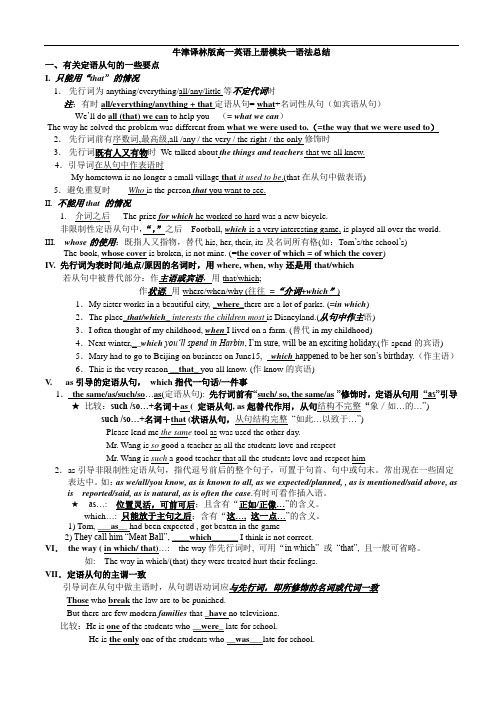
牛津译林版高一英语上册模块一语法总结一、有关定语从句的一些要点I. 只能用“that”的情况1.先行词为anything/everything/all/any/little等不定代词时注:有时all/everything/anything + that定语从句= what+名词性从句(如宾语从句)We’ll do all (that) we can to help you (= what we can)The way he solved the problem was different from what we were used to.(=the way that we were used to)2.先行词前有序数词,最高级,all /any / the very / the right / the only修饰时3.先行词既有人又有物时We talked about the things and teachers that we all knew.4.引导词在从句中作表语时My hometown is no longer a small village that it used to be.(that在从句中做表语)5.避免重复时Who is the person that you want to see.II. 不能用that 的情况1.介词之后The prize for which he worked so hard was a new bicycle.非限制性定语从句中,“,”之后Football,which is a very interesting game, is played all over the world. III. whose的使用:既指人又指物,替代his, her, their, its及名词所有格(如:Tom’s/the school’s) The book, whose cover is broken, is not mine. (=the cover of which = of which the cover)IV. 先行词为表时间/地点/原因的名词时,用where, when, why还是用that/which若从句中被替代部分:作主语或宾语,用that/which;作状语, 用where/when/why (往往=“介词+which”)1.My sister works in a beautiful city, _where_there are a lot of parks. (=in which)2.The place_that/which_ interests the children most is Disneyland.(从句中作主语)3.I often thought of my childhood, when I lived on a farm. (替代in my childhood)4.Next winter,__which you’ll spend in Harbin, I’m sure, will be an exciting holiday.(作spend的宾语)5.Mary had to go to Beijing on business on June15, which h appened to be her son’s birthday.(作主语)6.This is the very reason __that_ you all know. (作know的宾语)V. as引导的定语从句,which指代一句话/一件事1.the same/as/such/so…as(定语从句):先行词前有“such/ so, the same/as ”修饰时,定语从句用“as”引导★比较:such /so…+名词+as ( 定语从句, as起替代作用,从句结构不完整“象/如…的…”) such /so…+名词+that (状语从句,从句结构完整“如此…以致于…”)Please lend me the same tool as was used the other day.Mr. Wang is so good a teacher as all the students love and respectMr. Wang is such a good teacher that all the students love and respect him 2.as引导非限制性定语从句,指代逗号前后的整个句子,可置于句首、句中或句末。
【推荐】新教材牛津译林版必修第三册全册各单元单词短语句型语法提炼汇总
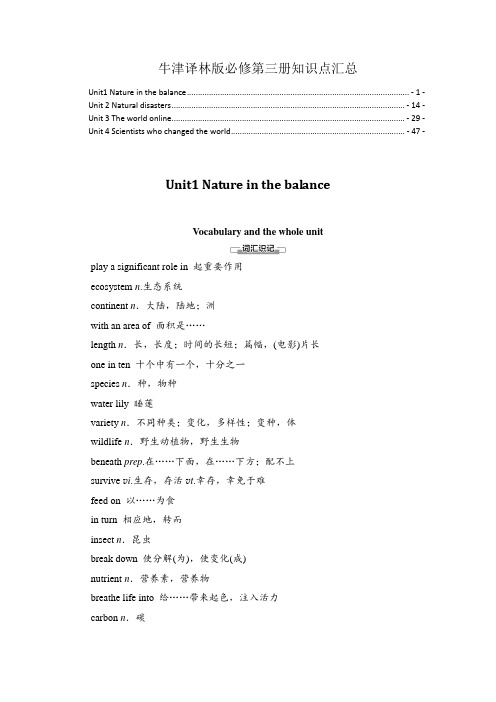
牛津译林版必修第三册知识点汇总Unit1 Nature in the balance ..................................................................................................... - 1 - Unit 2 Natural disasters .......................................................................................................... - 14 - Unit 3 The world online .......................................................................................................... - 29 - Unit 4 Scientists who changed the world ............................................................................... - 47 -Unit1 Nature in the balanceVocabulary and the whole unitplay a significant role in 起重要作用ecosystem n.生态系统continent n.大陆,陆地;洲with an area of 面积是……length n.长,长度;时间的长短;篇幅,(电影)片长one in ten 十个中有一个,十分之一species n.种,物种water lily 睡莲variety n.不同种类;变化,多样性;变种,体wildlife n.野生动植物,野生生物beneath prep.在……下面,在……下方;配不上survive v i.生存,存活v t.幸存,幸免于难feed on 以……为食in turn 相应地,转而insect n.昆虫break down 使分解(为),使变化(成)nutrient n.营养素,营养物breathe life into 给……带来起色,注入活力carbon n.碳oxygen n.氧,氧气thus ad v.因此,从而;这样agriculture n.农业,农学cattle n.牛impact n.影响,作用;撞击,冲撞v i & v t.有影响;冲击in danger of 处于……危险中extinction n.灭绝,绝种Focuses on language points根据词性和汉语提示,写出下列单词1.harm n.& v t.伤害,损害→harmful adj.有害的→harmless adj.无害的2.long adj.长的,长时间的→length n.长,长度;时间的长短;篇幅,(电影)片长3.survive v i.生存,存活v t.幸存,幸免于难→survival n.残存物;幸存事物→survivor n.幸存者;生还者4.disappear v i.不复存在,灭绝,消亡;消失;失踪→disappearance n.消失;失踪5.agriculture n.农业,农学→agricultural adj.农业的1.variety n.不同种类;变化,多样性;变种,变体①I was impressed by the variety of dishes on offer.不同种类②We want more variety in our work.变化,多样性③Apples come in a great many varieties.变种,变体2.living adj.活着的,活的;在使用的n.生计,谋生;生活方式①Father never talked about what he did for a living.生计②Chinese is one of the most beautiful languages that is living in the world.在使用的③He is the finest living pianist that I have ever seen.活着的Words and Phrases1harm n.& vt.伤害,损害(教材P1)The human race has done much harm.人类已经造成了许多危害。
新教材牛津译林版选择性必修第一册各单元重点语法
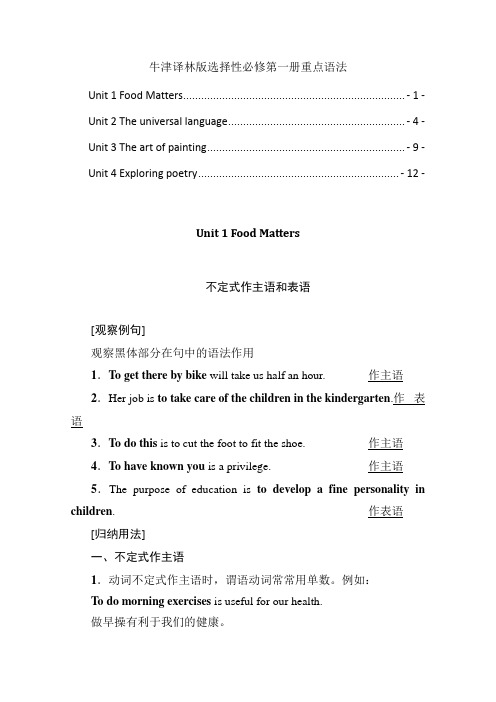
牛津译林版选择性必修第一册重点语法Unit 1 Food Matters .......................................................................... - 1 - Unit 2 The universal language ........................................................... - 4 - Unit 3 The art of painting .................................................................. - 9 - Unit 4 Exploring poetry ................................................................... - 12 -Unit 1 Food Matters不定式作主语和表语[观察例句]观察黑体部分在句中的语法作用1.To get there by bike will take us half an hour. 作主语2.Her job is to take care of the children in the kindergarten.作表语3.To do this is to cut the foot to fit the shoe. 作主语4.To have known you is a privilege. 作主语5.The purpose of education is to develop a fine personality in children. 作表语[归纳用法]一、不定式作主语1.动词不定式作主语时,谓语动词常常用单数。
例如:To do morning exercises is useful for our health.做早操有利于我们的健康。
新教材牛津译林版高中英语必修第二册全册各单元重点单词短语句型归纳总结
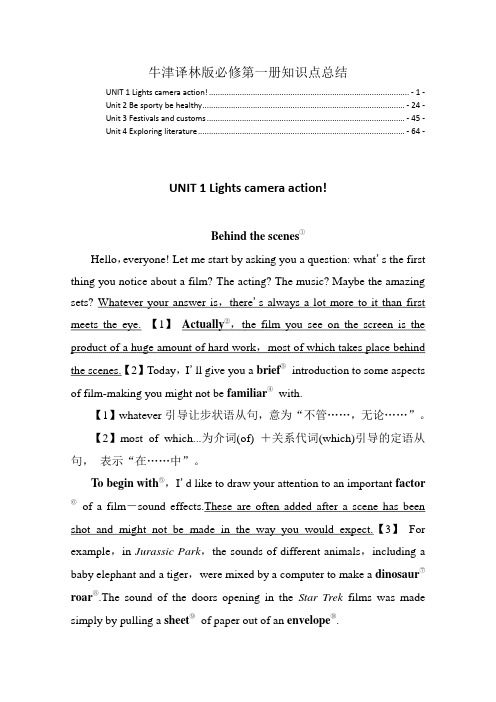
牛津译林版必修第一册知识点总结UNIT 1 Lights camera action! ........................................................................................... - 1 -Unit 2 Be sporty be healthy ............................................................................................ - 24 -Unit 3 Festivals and customs .......................................................................................... - 45 -Unit 4 Exploring literature .............................................................................................. - 64 -UNIT 1 Lights camera action!Behind the scenes①Hello,everyone! Let me start by asking you a question: what's the first thing you notice about a film? The acting? The music? Maybe the amazing sets? Whatever your answer is,there's always a lot more to it than first meets the eye. 【1】Actually②,the film you see on the screen is the product of a huge amount of hard work,most of which takes place behind the scenes.【2】Today,I'll give you a brief③introduction to some aspects of film-making you might not be familiar④with.【1】whatever引导让步状语从句,意为“不管……,无论……”。
- 1、下载文档前请自行甄别文档内容的完整性,平台不提供额外的编辑、内容补充、找答案等附加服务。
- 2、"仅部分预览"的文档,不可在线预览部分如存在完整性等问题,可反馈申请退款(可完整预览的文档不适用该条件!)。
- 3、如文档侵犯您的权益,请联系客服反馈,我们会尽快为您处理(人工客服工作时间:9:00-18:30)。
牛津高中英语-模块一第一单元一定语从句:定语从句的介绍1.就像是一个形容词或介词短语修饰名词一样,定语从句也可以修饰名词。
定语从句所修饰的名词称为先行词。
形容词:The green team介词短语:The team in green定语从句:The team who were wearing green2.定语从句通常由关系代词来引导,如which,that, who, whom, whose,或关系副词来引导,如when,where, why。
关系代词可以在定语从句中担当主语,宾语,表语,定语;关系副词可以在定语从句中担当状语。
如:做主语The trees which are on the school campus have lost their leaves.做宾语The student whom we saw just now is the best runner in ourschool.做表语Jack is no longer the lazy boy that he used to be.做定语She has a brother whose name I can’t remember.做状语The school where he studied is in Shenzhen.二定语从句:关系代词:that,which,who,whom,和whose1.在定语从句中,that和which用来指代物。
如:This is the story that /which we wrote for our storytelling contest.2.在定语从句中,who用来指代人。
如:I am going to see a friend who has just come back from the UK.3.当who在定语从句中做宾语时,可以用whom来取代,且whom比who更正式。
如:I don’t know the name of the teacher who/whom I saw in the computerroom the other day.4.当关系代词在定语从句中做宾语时,who,whom,which和that可以被省略。
如:He likes all the birthday presents(that/which)his friends gave him.5.Whose用来表示所属,它既可指人也可指物。
如:I sat next to a girl whose name was Diane.The club whose members are music fans meet in the school garden everySaturday afternoon.第二单元一定语从句:介词提前的定语从句(preposition+which; preposition+whom)1.当关系代词(which/whom)做定语从句中介词的宾语时,可以把介词提到关系代词的前面。
如:We thought you were a person from whom we could expect good decisions.2.在非正式英语中,介词通常放在定语从句的最后。
如:Art is the subject which I know little about.3.如果介词放在定语从句的最后,which可以被that取代,whom可以被that和who取代。
如:Dad is a person whom/that/who I can easily talk to.4.当关系代词做定语从句中介词的宾语,并且介词又放在定语从句的末尾时,我们通常省略关系代词who和that。
如:The topic (which) Eric is interested in is Physics.Daniel is the person (whom) I want to make friends with.5.当先行词是way时,我们用in which或that来引导定语从句,这种情况下,in which或that可以被省略。
如:I didn’t like the way (that /in which) she talked to me.二定语从句:关系副词:when,where,why1.我们通常用关系副词when引导先行词是time,moment,day,season,year等的定语从句。
如:Do you remember the day when we left you in charge?I often think of the moment when I saw the UFO.2.我们通常用关系副词where引导先行词是place,house,city,country,city,world等的定语从句。
如:The police searched the house where the thief had stayed.This is not a family where bad behavior goes unpunished.3.我们通常用关系副词why引导先行词是reason的定语从句。
如:I don’t know the reason why the house is so dirty.4.在更加正式的英语中,where,when和why能够被介词+which所替代。
如:The study is the place where/in which I often have talks with my father.This is the reason why/for which my parents got home earlier.It rained the whole day when/on which he traveled with his family.第三单元一定语从句:非限制性定语从句1.非限制性定语从句是一个为主句添加额外信息的从句,在非限制性定语从句前通常有个逗号。
如:Amy,who took weight-loss pills, now realizes that health is important.My pills are in the bathroom, where I always keep them.2.当先行词是整个主句时,可以用which来引导定语从句。
如:He missed the show, which was a great pity.3.我们可以用all+whom/which来表示全部数量,用someof+whom/which来表示部分数量。
如:I am doing different types of exercises, all of which are quite helpfulto my health.Many people, some of whom are not overweight, are going on diet.二附加疑问句1.附加疑问句是放在陈述句后面的短问句。
它们通常被用在口语中来引出一段对话,以一个更加礼貌的方式来询问信息,温柔的发号施令或要求某人做某事。
我们用附加疑问句来询问意见或征求同意。
当我们用附加疑问句来询问意见时,为了期待对方能同意我们的观点,附加疑问句会用降调来表达。
当我们用附加疑问句来征求同意时,我们实际上是在询问我们自己也不太能确信的事情,这时候附加疑问句会用升调来表达。
2.附加疑问句的构成有以下几种:1)在肯定的陈述句之后,我们会用否定的附加疑问句。
在否定的陈述句之后,我们会用肯定的附加疑问句。
如:We can still be friends, can’t we?He doesn’t like ice cream, does he?2)当主句中有像neither,none,nobody,nothing,few,little,never,hardly或seldom这类词时,它们被认为是否定的,因此后面会跟个肯定的附加疑问句。
如:Neither of you will have coffee, will you?No one has found my CD, have they?Nobody understood his speech, did they?His sister seldom argues with people, does she?3)人称代词如I,we,you,he,she,it或they会放在附加疑问句中。
如:I was pretty silly, wasn’t I?Everyone has advises you not to go on a diet, haven’t you?4)助动词,情态动词或be动词会放在附加疑问句中。
如:You like traveling, don’t you?There is something wrong, isn’t there?You can’t speak Italian, can you?5)祁使句后用will you,Let’s后用shall we如:Post a letter for me, will you?Let’s have a break, shall we?牛津高中英语-模块二第一单元一现在完成时态1.我们用现在完成时态来表示在最近的过去发生的但跟现在有联系的事情。
如:The disappearance of Justin has made Kelly very unhappy.2.我们也用现在完成时态来表示在过去刚开始,并且现在还没结束的事情。
如:I have not seen Justin since last Friday night.3.当动作发生的确切时间不清楚或不重要时,我们也用现在完成时态。
经常连用的时间短语有:already ever for just lately never recently since yetalready 用语肯定句,yet用语否定句。
如:The boy has already come home. I haven’t heard anything from himyet.for+一段时间since+点时间如:We haven’t seen him for two years. We haven’t seen him since 2002.注:当已给定具体的时间时,我们往往用一般过去时态,而不是现在完成时态。
4.我们用现在完成时态来谈论刚刚完成的动作。
